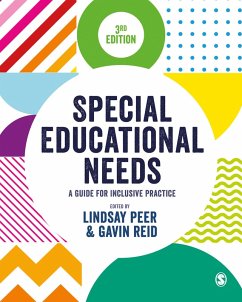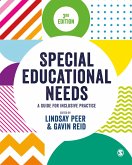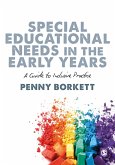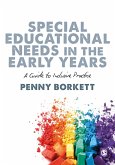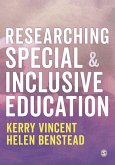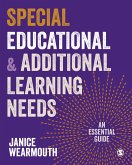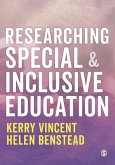Special Educational Needs (eBook, ePUB)
A Guide for Inclusive Practice
Redaktion: Peer, Lindsay; Reid, Gavin
34,95 €
34,95 €
inkl. MwSt.
Sofort per Download lieferbar

17 °P sammeln
34,95 €
Als Download kaufen

34,95 €
inkl. MwSt.
Sofort per Download lieferbar

17 °P sammeln
Jetzt verschenken
Alle Infos zum eBook verschenken
34,95 €
inkl. MwSt.
Sofort per Download lieferbar
Alle Infos zum eBook verschenken

17 °P sammeln
Special Educational Needs (eBook, ePUB)
A Guide for Inclusive Practice
Redaktion: Peer, Lindsay; Reid, Gavin
- Format: ePub
- Merkliste
- Auf die Merkliste
- Bewerten Bewerten
- Teilen
- Produkt teilen
- Produkterinnerung
- Produkterinnerung

Bitte loggen Sie sich zunächst in Ihr Kundenkonto ein oder registrieren Sie sich bei
bücher.de, um das eBook-Abo tolino select nutzen zu können.
Hier können Sie sich einloggen
Hier können Sie sich einloggen
Sie sind bereits eingeloggt. Klicken Sie auf 2. tolino select Abo, um fortzufahren.

Bitte loggen Sie sich zunächst in Ihr Kundenkonto ein oder registrieren Sie sich bei bücher.de, um das eBook-Abo tolino select nutzen zu können.
This guide to inclusive practice covers contemporary policy issues, perspectives from practice and specialist guidance from across a wide range of common syndromes. Bringing together the important combination of theory, knowledge and practice, each chapter is written by experts from fields within Special and Additional Educational Needs.
This third edition includes new chapters on:
- The current context of SEN current context: in research and practice
- Speech, language and communication
- The role and use of technology in supporting learners with SEND
- Pathological/Extreme…mehr
- Geräte: eReader
- mit Kopierschutz
- eBook Hilfe
- Größe: 3.07MB
Andere Kunden interessierten sich auch für
![Special Educational Needs (eBook, ePUB) Special Educational Needs (eBook, ePUB)]() Special Educational Needs (eBook, ePUB)34,95 €
Special Educational Needs (eBook, ePUB)34,95 €![Special Educational Needs in the Early Years (eBook, ePUB) Special Educational Needs in the Early Years (eBook, ePUB)]() Penny BorkettSpecial Educational Needs in the Early Years (eBook, ePUB)32,95 €
Penny BorkettSpecial Educational Needs in the Early Years (eBook, ePUB)32,95 €![Special Educational Needs in the Early Years (eBook, ePUB) Special Educational Needs in the Early Years (eBook, ePUB)]() Penny BorkettSpecial Educational Needs in the Early Years (eBook, ePUB)32,95 €
Penny BorkettSpecial Educational Needs in the Early Years (eBook, ePUB)32,95 €![Researching Special and Inclusive Education (eBook, ePUB) Researching Special and Inclusive Education (eBook, ePUB)]() Kerry VincentResearching Special and Inclusive Education (eBook, ePUB)26,95 €
Kerry VincentResearching Special and Inclusive Education (eBook, ePUB)26,95 €![Special Educational and Additional Learning Needs (eBook, ePUB) Special Educational and Additional Learning Needs (eBook, ePUB)]() Janice WearmouthSpecial Educational and Additional Learning Needs (eBook, ePUB)26,95 €
Janice WearmouthSpecial Educational and Additional Learning Needs (eBook, ePUB)26,95 €![Special Educational and Additional Learning Needs (eBook, ePUB) Special Educational and Additional Learning Needs (eBook, ePUB)]() Janice WearmouthSpecial Educational and Additional Learning Needs (eBook, ePUB)26,95 €
Janice WearmouthSpecial Educational and Additional Learning Needs (eBook, ePUB)26,95 €![Researching Special and Inclusive Education (eBook, ePUB) Researching Special and Inclusive Education (eBook, ePUB)]() Kerry VincentResearching Special and Inclusive Education (eBook, ePUB)26,95 €
Kerry VincentResearching Special and Inclusive Education (eBook, ePUB)26,95 €-
-
-
This guide to inclusive practice covers contemporary policy issues, perspectives from practice and specialist guidance from across a wide range of common syndromes. Bringing together the important combination of theory, knowledge and practice, each chapter is written by experts from fields within Special and Additional Educational Needs.
This third edition includes new chapters on:
- The current context of SEN current context: in research and practice
- Speech, language and communication
- The role and use of technology in supporting learners with SEND
- Pathological/Extreme Demand Avoidance (PDA/EDA)
- Working together
- Children and Young People's Perspectives
Providing a solid foundation for understanding and supporting learners with additional needs, this comprehensive text is ideal whether you are a student, teacher or education practitioner.
This third edition includes new chapters on:
- The current context of SEN current context: in research and practice
- Speech, language and communication
- The role and use of technology in supporting learners with SEND
- Pathological/Extreme Demand Avoidance (PDA/EDA)
- Working together
- Children and Young People's Perspectives
Providing a solid foundation for understanding and supporting learners with additional needs, this comprehensive text is ideal whether you are a student, teacher or education practitioner.
Dieser Download kann aus rechtlichen Gründen nur mit Rechnungsadresse in A, D ausgeliefert werden.
Produktdetails
- Produktdetails
- Verlag: SAGE Publications
- Seitenzahl: 424
- Erscheinungstermin: 11. November 2020
- Englisch
- ISBN-13: 9781529737424
- Artikelnr.: 59385006
- Verlag: SAGE Publications
- Seitenzahl: 424
- Erscheinungstermin: 11. November 2020
- Englisch
- ISBN-13: 9781529737424
- Artikelnr.: 59385006
- Herstellerkennzeichnung Die Herstellerinformationen sind derzeit nicht verfügbar.
Dr Lindsay Peer CBE, practitioner psychologist, international speaker, author and expert witness, and is widely recognised as an expert in the range of Specific Learning Difficulties, special educational needs and mainstream education. In 2002, she was appointed CBE for services to Education and Dyslexia. She is a Patron of GroOops, a charity dedicated to creating an emotionally healthy, dyslexia aware world. In 2011, she was presented with an Outstanding Lifetime Academic Achievement Award by the British Dyslexia Association. In 2017, she won a Science Council Chartered Scientist CPD Commendation. She is an Associate Fellow and Chartered Scientist of the British Psychological Society, and Fellow of both the International Academy of Research in Learning Disabilities and the Royal Society of Arts. She is a member of the Association of Child Psychologists in Private Practice and of the Association for Child and Adolescent Mental Health. She is registered to practice with the Health and Care Professions Council.
?
She held the posts of Education Director and Deputy CEO of the BDA. She has had many years' experience as a teacher, teacher trainer and SENCo. Lindsay has been a keynote speaker in the UK, USA, India, Sweden, Belgium, Finland, Israel, Iceland, Norway, Italy, Spain, Majorca, Greece, South Africa, Botswana, Swaziland, Cyprus, the Czech Republic and the Netherlands. She has further advised governments, policy makers, lawyers, adults, schools, psychologists, therapists and parents. She has published a considerable body of material both theoretical and practical, and published the first ground-breaking book linking Glue Ear with Dyslexia.
Her email address is: lindsay@peergordonassociates.co.uk and her website is: www.peergordonassociates.co.uk.
?
She held the posts of Education Director and Deputy CEO of the BDA. She has had many years' experience as a teacher, teacher trainer and SENCo. Lindsay has been a keynote speaker in the UK, USA, India, Sweden, Belgium, Finland, Israel, Iceland, Norway, Italy, Spain, Majorca, Greece, South Africa, Botswana, Swaziland, Cyprus, the Czech Republic and the Netherlands. She has further advised governments, policy makers, lawyers, adults, schools, psychologists, therapists and parents. She has published a considerable body of material both theoretical and practical, and published the first ground-breaking book linking Glue Ear with Dyslexia.
Her email address is: lindsay@peergordonassociates.co.uk and her website is: www.peergordonassociates.co.uk.
Chapter 1: Introduction - Gavin Reid & Lindsay Peer
Part I: Policy, Practice and Provision
Chapter 2: Special and additional support needs in England and Scotland: current dilemmas and solutions - Sheila Riddell, Elisabet Weedon & Neville Harris
Chapter 3: Putting the dyslexic learner at the centre - Janice Wearmouth
Chapter 4: Inclusion and special educational needs: a dialogic inquiry into controversial issues - Artemi Sakellariadis
Chapter 5: The potential impact and influence of the social model of disability - Charles Weedon
Part II: Perspectives from Practice
Chapter 6: Speech, language and communication - Juanita Hurley and Sally Moore
Chapter 7: Auditory Processing Disorder - Tony Sirimanna
Chapter 8: Developmental coordination disorder/ developmental dyspraxia in the context of education - Sally Scott-Roberts & Dr Catherine Purcell
Chapter 9: Vision and learning - John Stevenson
Chapter 10: Literacy: literacy and the training of professionals who teach and assess individuals with literacy difficulties - Margaret Crombie, Julian Brown & Una Lodge
Chapter 11: Mathematics learning difficulties and dyscalculia - Steve Chinn
Chapter 12: The role of technology in supporting young people with Additional and Special Needs - Arran Smith
Chapter 13: Using technology to support learners with additional needs: practical information and advice - Adam Gordon
Part III: Syndromes and the Brain
Chapter 14: Students with Down syndrome in inclusive classrooms: using evidence-based practices - Iva Strnadová & David Evans
Chapter 15: Attention deficit hyperactivity disorder - Fin O'Regan
Chapter 16: Visual and cerebral impairment and mainstream education: beyond mere awareness raising - John Ravenscroft
Chapter 17: Students with hearing loss - Jill Duncan
Chapter 18: Pathological/Extreme Demand Avoidance (PDA/EDA) - Richard Soppitt
Chapter 19: Autism Spectrum Disorder (ASD): Identification, Intervention and Research - Jo-Ann Page
Part IV: Working Together
Chapter 20: Working together: a system working together to serve the child with Special Educational Needs? A critical look at current practice in Irish primary education - Fidelma Healy Eames & Annmarie Meehan
Chapter 21: Parents as partners - Jillian Zocher & Katie Nelson
Chapter 22: Children and Young People's Perspectives - Jennie Guise, Jenn Clark & Jo-Ann Page
Part I: Policy, Practice and Provision
Chapter 2: Special and additional support needs in England and Scotland: current dilemmas and solutions - Sheila Riddell, Elisabet Weedon & Neville Harris
Chapter 3: Putting the dyslexic learner at the centre - Janice Wearmouth
Chapter 4: Inclusion and special educational needs: a dialogic inquiry into controversial issues - Artemi Sakellariadis
Chapter 5: The potential impact and influence of the social model of disability - Charles Weedon
Part II: Perspectives from Practice
Chapter 6: Speech, language and communication - Juanita Hurley and Sally Moore
Chapter 7: Auditory Processing Disorder - Tony Sirimanna
Chapter 8: Developmental coordination disorder/ developmental dyspraxia in the context of education - Sally Scott-Roberts & Dr Catherine Purcell
Chapter 9: Vision and learning - John Stevenson
Chapter 10: Literacy: literacy and the training of professionals who teach and assess individuals with literacy difficulties - Margaret Crombie, Julian Brown & Una Lodge
Chapter 11: Mathematics learning difficulties and dyscalculia - Steve Chinn
Chapter 12: The role of technology in supporting young people with Additional and Special Needs - Arran Smith
Chapter 13: Using technology to support learners with additional needs: practical information and advice - Adam Gordon
Part III: Syndromes and the Brain
Chapter 14: Students with Down syndrome in inclusive classrooms: using evidence-based practices - Iva Strnadová & David Evans
Chapter 15: Attention deficit hyperactivity disorder - Fin O'Regan
Chapter 16: Visual and cerebral impairment and mainstream education: beyond mere awareness raising - John Ravenscroft
Chapter 17: Students with hearing loss - Jill Duncan
Chapter 18: Pathological/Extreme Demand Avoidance (PDA/EDA) - Richard Soppitt
Chapter 19: Autism Spectrum Disorder (ASD): Identification, Intervention and Research - Jo-Ann Page
Part IV: Working Together
Chapter 20: Working together: a system working together to serve the child with Special Educational Needs? A critical look at current practice in Irish primary education - Fidelma Healy Eames & Annmarie Meehan
Chapter 21: Parents as partners - Jillian Zocher & Katie Nelson
Chapter 22: Children and Young People's Perspectives - Jennie Guise, Jenn Clark & Jo-Ann Page
Chapter 1: Introduction - Gavin Reid & Lindsay Peer
Part I: Policy, Practice and Provision
Chapter 2: Special and additional support needs in England and Scotland: current dilemmas and solutions - Sheila Riddell, Elisabet Weedon & Neville Harris
Chapter 3: Putting the dyslexic learner at the centre - Janice Wearmouth
Chapter 4: Inclusion and special educational needs: a dialogic inquiry into controversial issues - Artemi Sakellariadis
Chapter 5: The potential impact and influence of the social model of disability - Charles Weedon
Part II: Perspectives from Practice
Chapter 6: Speech, language and communication - Juanita Hurley and Sally Moore
Chapter 7: Auditory Processing Disorder - Tony Sirimanna
Chapter 8: Developmental coordination disorder/ developmental dyspraxia in the context of education - Sally Scott-Roberts & Dr Catherine Purcell
Chapter 9: Vision and learning - John Stevenson
Chapter 10: Literacy: literacy and the training of professionals who teach and assess individuals with literacy difficulties - Margaret Crombie, Julian Brown & Una Lodge
Chapter 11: Mathematics learning difficulties and dyscalculia - Steve Chinn
Chapter 12: The role of technology in supporting young people with Additional and Special Needs - Arran Smith
Chapter 13: Using technology to support learners with additional needs: practical information and advice - Adam Gordon
Part III: Syndromes and the Brain
Chapter 14: Students with Down syndrome in inclusive classrooms: using evidence-based practices - Iva Strnadová & David Evans
Chapter 15: Attention deficit hyperactivity disorder - Fin O'Regan
Chapter 16: Visual and cerebral impairment and mainstream education: beyond mere awareness raising - John Ravenscroft
Chapter 17: Students with hearing loss - Jill Duncan
Chapter 18: Pathological/Extreme Demand Avoidance (PDA/EDA) - Richard Soppitt
Chapter 19: Autism Spectrum Disorder (ASD): Identification, Intervention and Research - Jo-Ann Page
Part IV: Working Together
Chapter 20: Working together: a system working together to serve the child with Special Educational Needs? A critical look at current practice in Irish primary education - Fidelma Healy Eames & Annmarie Meehan
Chapter 21: Parents as partners - Jillian Zocher & Katie Nelson
Chapter 22: Children and Young People's Perspectives - Jennie Guise, Jenn Clark & Jo-Ann Page
Part I: Policy, Practice and Provision
Chapter 2: Special and additional support needs in England and Scotland: current dilemmas and solutions - Sheila Riddell, Elisabet Weedon & Neville Harris
Chapter 3: Putting the dyslexic learner at the centre - Janice Wearmouth
Chapter 4: Inclusion and special educational needs: a dialogic inquiry into controversial issues - Artemi Sakellariadis
Chapter 5: The potential impact and influence of the social model of disability - Charles Weedon
Part II: Perspectives from Practice
Chapter 6: Speech, language and communication - Juanita Hurley and Sally Moore
Chapter 7: Auditory Processing Disorder - Tony Sirimanna
Chapter 8: Developmental coordination disorder/ developmental dyspraxia in the context of education - Sally Scott-Roberts & Dr Catherine Purcell
Chapter 9: Vision and learning - John Stevenson
Chapter 10: Literacy: literacy and the training of professionals who teach and assess individuals with literacy difficulties - Margaret Crombie, Julian Brown & Una Lodge
Chapter 11: Mathematics learning difficulties and dyscalculia - Steve Chinn
Chapter 12: The role of technology in supporting young people with Additional and Special Needs - Arran Smith
Chapter 13: Using technology to support learners with additional needs: practical information and advice - Adam Gordon
Part III: Syndromes and the Brain
Chapter 14: Students with Down syndrome in inclusive classrooms: using evidence-based practices - Iva Strnadová & David Evans
Chapter 15: Attention deficit hyperactivity disorder - Fin O'Regan
Chapter 16: Visual and cerebral impairment and mainstream education: beyond mere awareness raising - John Ravenscroft
Chapter 17: Students with hearing loss - Jill Duncan
Chapter 18: Pathological/Extreme Demand Avoidance (PDA/EDA) - Richard Soppitt
Chapter 19: Autism Spectrum Disorder (ASD): Identification, Intervention and Research - Jo-Ann Page
Part IV: Working Together
Chapter 20: Working together: a system working together to serve the child with Special Educational Needs? A critical look at current practice in Irish primary education - Fidelma Healy Eames & Annmarie Meehan
Chapter 21: Parents as partners - Jillian Zocher & Katie Nelson
Chapter 22: Children and Young People's Perspectives - Jennie Guise, Jenn Clark & Jo-Ann Page
